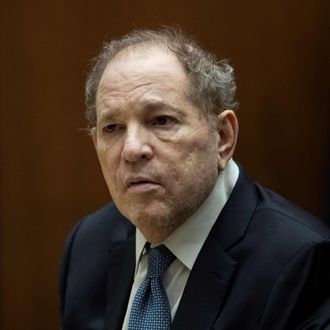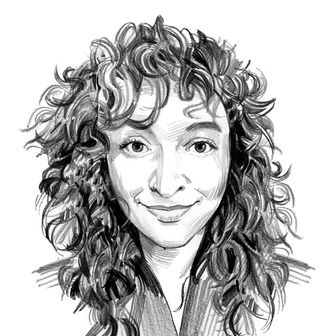
Harvey Weinstein’s lawyers pushed New York’s highest court to overturn his rape conviction on Wednesday, February 14, arguing that “our client did not get a fair trial” because prosecutors were allowed to bring up a litany of accusations unrelated to the charges. Attorney Arthur Aidala’s argument before the New York State Court of Appeals focused extensively on the prosecution’s use of prior, uncharged bad acts during its case. While Weinstein was charged in relation to sexually assaulting three women, prosecutors also called three other accusers, who testified about his alleged misconduct.
The prosecution’s decision to call them didn’t help jurors to better understand the crimes with which Weinstein was charged, Aidala argued, but just made him so unlikable that a conviction was virtually inevitable. Aidala said that “it was his character that was on trial — it wasn’t the evidence that was on trial.”
Weinstein’s fight before the New York State Court of Appeals came nearly four years after the fallen movie mogul was convicted of rape in the third degree and criminal sexual act in the first degree for attacking two women, Jessica Mann and Mimi Haleyi. Mann, who had been an aspiring actress, told jurors that Weinstein had raped her at a Midtown East hotel in early 2013. Haleyi testified that Weinstein forcibly performed oral sex on her during the summer of 2006 at his Soho home. Weinstein was acquitted of two predatory-sexual-assault counts, which hinged on actress Annabella Sciorra’s allegation that he had raped her around late 1993. Three other women — Dawn Dunning, Tarale Wulff, and Lauren Young — accused Weinstein of misconduct at his trial; Manhattan prosecutors did not charge him in relation to their claims. On March 11, 2020, Weinstein was sentenced to 23 years in prison.
Steven Wu, who argued before the appeals court for the Manhattan DA’s office, said that the testimony of three women about uncharged alleged misconduct was not meant as a pile-on. Rather, they described being in situations similar to those of the women whom Weinstein was charged with attacking: agreeing to meet with him privately to discuss work or professional advancement, for example. “‘I was asking for favors … but I did not consent to sexual activity, and he knew that,’” Wu said of the thought behind this testimony. “What these witnesses showed is that it was not invariably true, in these circumstances … that their willingness to come to him was not [necessarily] consent to sexual behavior.”
During his rebuttal, Aidala argued that this position was insulting to women. If a high-schooler asked a girl to prom and she said “no,” should he assume that the next girl would say “no” — and avoid asking her out?
“You know what they’re saying: All women are alike. All women act the same way,” Aidala said, later adding, “They’re saying, ‘It makes no sense. It’s a ridiculous argument.’”
Weinstein had previously fought his conviction in a lower state appeals court, but the panel of justices upheld the guilty verdict. He was also convicted on three charges, including the forcible rape of Jane Doe No. 1, in his Los Angeles rape trial on December 19, 2022. He was sentenced to 16 years in prison for his California case. He has maintained his innocence.
Weinstein, now 71, will likely spend the rest of his life behind bars owing to the sentences from his convictions. He has routinely complained about his declining health. After Weinstein was convicted in New York, he was treated in a hospital jail unit for one week before being taken to Rikers Island. He has lost at least four teeth in prison, and his eyesight has declined tremendously. And when sentenced in Los Angeles, Weinstein was in a wheelchair in the courtroom, per the New York Times.
Asked for comment on the appeal proceedings, a rep for Weinstein said, “Harvey is keeping hopeful and doing the best he can maintaining his health, even as he suffers from several painful ailments. He reads and follows news and events, writes, and talks with his children.
“He is hoping that the New York State Court of Appeals sees his argument and appreciates his predicament of not having a fair and objective trial. He is innocent of those charges.”


